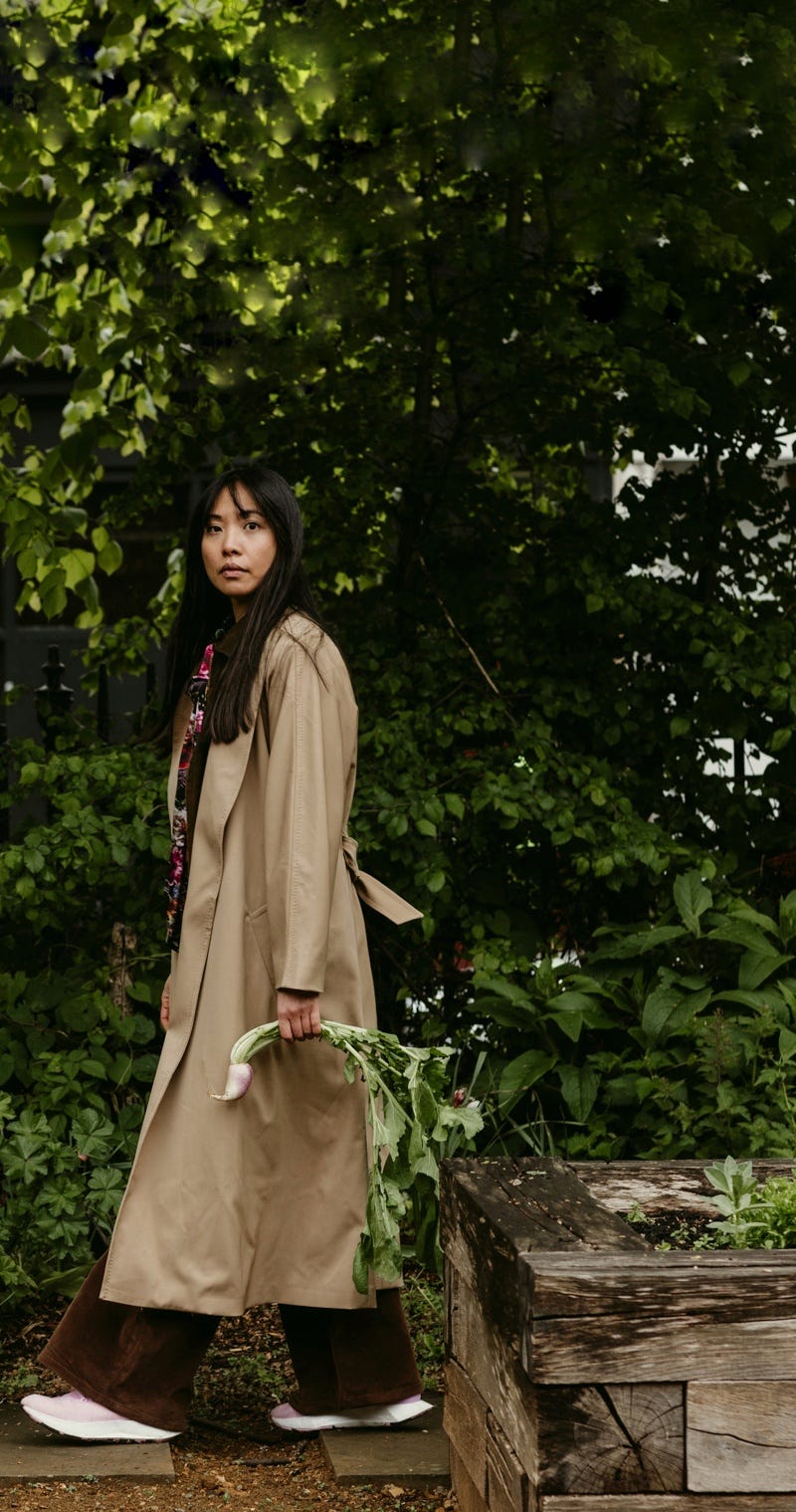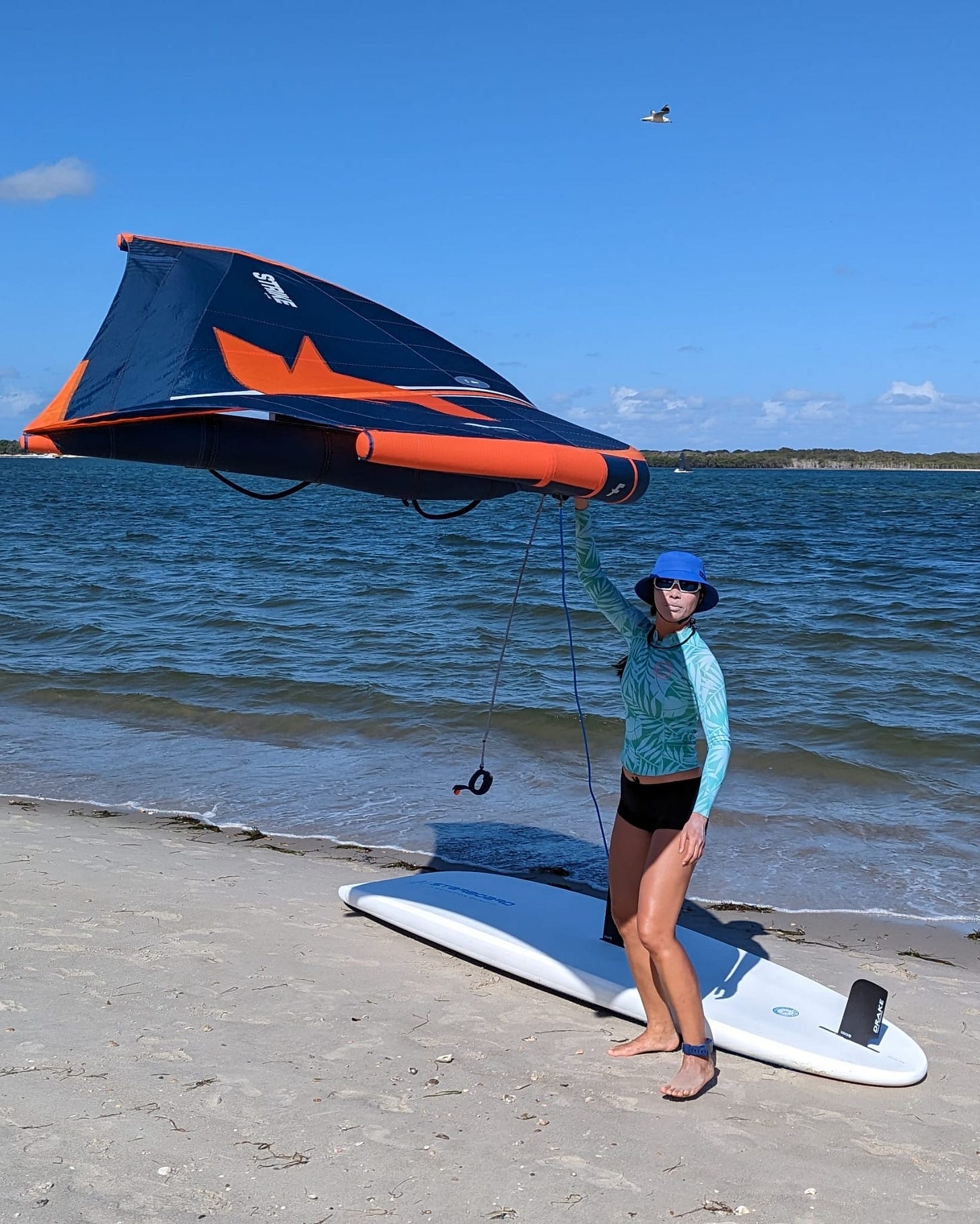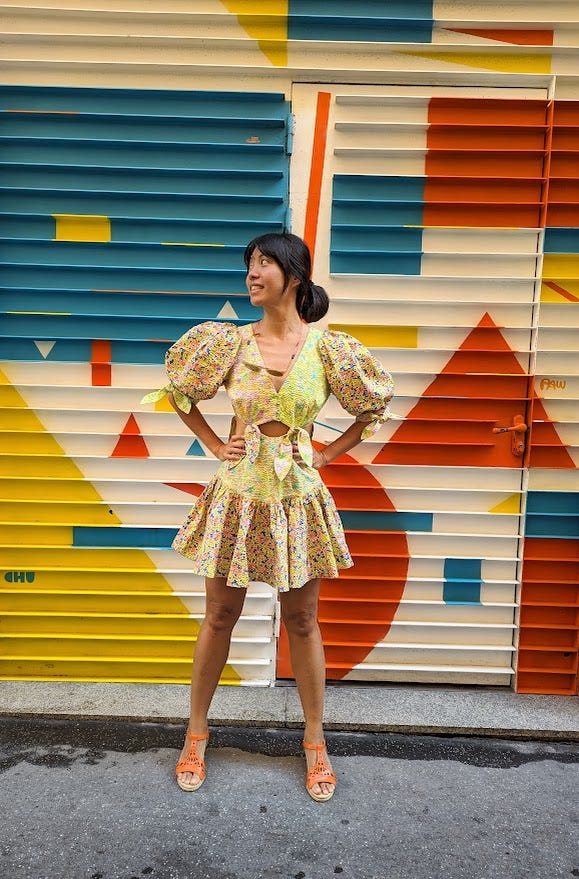'Prioritise fun over duty'
Climate economist, wind chaser and farm lover, Catherine Chong, shares her day well spent
Hi! This is Leyla from A Day Well Spent, a newsletter seeking pathways to more purposeful living.
What subscribers received recently:
TV used to dominate my life — then a few years ago, everything changed
An honest ‘day in my life’ for a work day and a rest day
You can subscribe with your email to ensure you never miss my posts:
I am delighted to bring to you the next interview on A Day Well Spent where every few weeks, I ask someone who inspires me, interests me and embodies the ethos of this newsletter, 15 quickfire questions.
Catherine Chong is a climate economist. She helps companies and governments make the link between the big decisions they make and the socioecological impacts they will have, including climate change.
She is a passionate lobbyist for agroecology, a movement that promotes producing nutritious food in a way that looks after both people and planet. In other words, a girl after my own heart.
Catherine is also co-founder of social enterprise Farms to Feed Us, a UK wide database connecting food producers directly with shoppers. Through the producer stories they tell, Farms to Feed Us are doing the vital work of helping reframe the image of food production as a source of beauty, health and fulfilment. It will be getting an interactive re-launch towards the end of this year.
Their mantra is ‘it’s time to value the people who feed us’ — amen!
Catherine grew up in a farming family in Malaysia and her activism draws on her pain from experiencing — first hand — the adverse impact of ‘the mammoth industry which continues to suck in and suck dry small-scale farmers’ in the global south.
After climbing the corporate ladder in finance to pay off her family's debt, she is doing what she does today. And the world is a better place for it!
Catherine and I have followed each other online for a while but we met in person a couple of years ago at Groundswell (a regenerative agriculture festival — such a thing does exist and it’s great!) where we ate a lot of good food and had a great time hanging out.
I appreciate her soul and energy and her relentless work towards fixing our very broken food system. Thank you for answering these questions, Catherine!
Interviews here will always be free to read. If you would like me to continue curating them for you to enjoy — along with all the other writing on A Day Well Spent (here’s the full archive of 120+ articles) — why not consider becoming a member for the price of just two coffees a month.
It would be my pleasure to welcome you.
And if you enjoy this piece, please let me know by tapping the ❤️ at the top or bottom or by forwarding it on — thank you!

1. What makes up a day well spent for you?
If I’m in Cornwall or anywhere by the sea.
A morning has to start with a cup of home-brewed coffee and swim in the sea at the crack of dawn. I am very lucky to have a view of one of the most popular surfing beaches in the country from the bedroom windows. I get to see the sea conditions as I wake.
I love, love, love going in when the tide is just going out with about a metre of beach, and especially if the conditions are mid-level rough — in Cornwall terms that’s on-shore or cross-shore 20-25 knots, 1-2 metre waves with lots of white bubbles. Even better is the sea temperature is 10C-12C.
I would have a warming stew of sorts for brunch or lunch. As ever, made with seasonal ingredients farmed by the local agroecological communities.
The main thing for the day would be to chase the wind. I’ve been learning a new water sport called wing foiling for the last few years. A highly wind-dependent sport. I’m not good enough to go out when it's too windy and you don't get going if there’s not enough wind. If I get a couple of sets of 2 to 3 hours faffing around with it, I’m chuffed.
And I love a long dip at dusk before a scrumptious dinner at a farm-to-fork sort of place.
If I’m in a foodie city, I would be cycling across the city for as many food stops as possible, meeting up with different friends at each stop!
2. What compliment have you received in recent times that's stuck in your memory?
I received various compliments throughout my career as a jet-setting person in finance, but none humbled me to the core — my true self — like this one.
I went back to my hometown when Dad passed away. I haven’t lived there for over 20 years. I stopped to speak to a group of elderly women when I overheard their conversation. They were talking about a farmer who just passed away, pointing to a funeral notice on a bulletin board by the local food market.
“He reared the best chicken.”
“He always gives me some fruits for free when I buy.”
“I would not cook baek zam gae (a dish of plain boiled chicken with some ginger and salt) if I can’t manage to get his chicken,” they said.
They were talking about my Dad.
When I told them that I was his daughter, they enthused simultaneously, “You’re the daughter who is selling organic veg in the UK.”
That’s not what I do as a climate economist in sustainable development, or as a lobbyist for agroecology. But that is what my dad seemed to think I do.
Dad was a farmer with little formal education but incredible indigenous knowledge. He was lured into industrial farming and our life was subsequently destroyed when the farm failed and we were left with a mountain of debt.
I spent the first decade of my working life paying the debt and Dad eventually recovered from the shame by returning to farming and forestry (known in the west as agroforestry).
What the ladies said showed that the community revere farmers who feed them nutritious food and so I suppose, for Dad, the best thing I am doing and could have done professionally is enabling the selling and eating of organic produce.
3. What quotes or mantras do you try to live by?
Since 2021, I have been trying to prioritise fun over duty.
4. What practical skill do you have that you value the most?
I can whip up a really good stew relatively quickly with simple ingredients. Also, I give a really good hug.
5. What do you know today that you wish you'd known five years ago?
That the pandemic was coming and I should get Mom and Dad to where I would be during the global lockdowns.
6. What character or personality trait about yourself do you value the most?
In the past, I valued being earnest and accountable. Moving forward, I’d like to value being fun and joyful, whilst remaining earnest and accountable.
7. What does 'eating well' mean to you and how do you manage it?
Of the circa 21 main meals in a week (7 days x 3), at least 15 are home-cooked.
As a principle, I prioritise buying seasonal fresh produce that is farmed by agroecological communities. I buy from where there is high certainty that most of what I pay goes to supporting the farmers — who are shouldering the bulk of weather-related, financial and supply chain risks — to sustain or transition to agroecology.
For me, eating well every day is more important than dressing well and certainly more important than going on holidays.
I have a weekly veg box from Riverford, I go to this fantastic all-organic market called Growing Communities when I’m in London, and only buy from the supermarkets when I need to fill in the gaps. When I eat out, I look out for those who source from their local agroecological communities.
I get super excited when what I buy and eat contribute to both environmental and social benefits. For instance, seed saving and sharing, the revival of ancient or landrace varieties in plants and animals, etc.
8. What is your ultimate dream?
I need to untangle traumas, learn and unlearn, and discern what I truly enjoy, versus what I thought I must do to be deserving of love and acceptance from my loved ones and communities.
After decades of living with extreme anxiety — including an insecurity that developed after my family fell into abject poverty after Dad’s intensive industrial poultry farming business failed — as well as decades of living peripatetically and prioritising working over ‘living’, I’m still working on it.
9. What's your most loved skincare / beauty product or secret?
This is an affordable and highly effective face mask for those prone to high sebum build-ups.
A face mask made of thin sheets of cotton pads (preferably made with organically farmed and unbleached cotton) dipped in raw egg white. When the sheets dry, you’ll peel a noticeable amount of comedones (aka blackheads and whiteheads) off your face.
10. How do you counter the fast-paced and immediate nature of today's world?
It’s my resolution for this year. I stop having my mobile phone next to the bed, so I don’t respond to the urge of replying to emails before I go to bed or just as I wake up in the morning.
11. What are your hobbies and interests? What do you like to do in your free time?
I love visiting farms as a hobby. I grew up visiting farms with my family during school breaks. It sticks. To counter my urge to spend too much time thinking about food, I have been brewing interests in water sports over the last few years, mainly wing foiling.
12. What's the latest thing that you have learnt?
'Tacking' when wing surfing while foiling, because turning upwind while keeping the foil surfing on the water is technically harder than turning downwind for a wing surf newbie like me.
A 'foil' in wing surfing is a wing-shaped fin that extends underwater and lifts the board out of the water.
13. Tell us about something you tried or did for the very first time recently
Lying on the beach, doing nothing.
I am a very antsy person. I have always felt guilty if I’m not being productive — what I do has to justify a logical end. Calming my mind to accept I shan’t do anything for anyone has been incredibly empowering.
14. What book should everyone read and why?
If I have to choose one, it has to be The Little Prince by Antoine de Saint-Exupéry.
It has some simple messages that I think are quite universal. For instance, what makes us wiser is the love of loving and the discipline to look after the people and things (socioecosystems) that look after us.
15. What are you working on that we should know about?
This year I’ve started to run a series of short ‘eating for agroecology’ corporate courses, one of which is how to eat for biodiversity.
It’s usually a 1-hour presentation with a selection of scrumptious food (to eat during the session), to link our everyday food with socioecosystems and the amazing things that the agroecological movements do around us.
I do my best to give an update on what I'm up to on my Instagram and website.
Catherine is also a freelance writer on the topic of agroecology — here are some of her pieces you might enjoy:
Food eco-labels: is it wise to let industry mark its own homework?
NEONICS - The EU-banned pesticide England nearly let back in
If you enjoyed this piece, you might like to check out the other interviews on A Day Well Spent.



